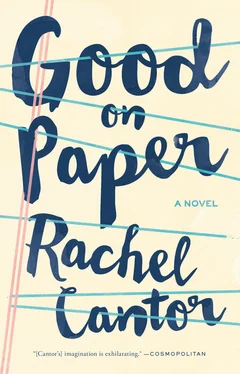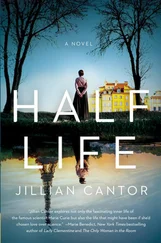I don’t know, I said, wondering how I could have missed this, and explained about Esther’s penne , how Romei’s penna from the first section, filled with ink by Esther and resounding with the fluttering of writer/bird wings, became Esther’s rejected sustenance, vomited to the ground like Icarus defeathered.
Then she’s also vomited up the flying girl, the daughter we first saw flying like an airplane around her mother’s park bench — if we understand the child to be winged.
I suppose so.
What did you think it was about? Benny asked.
I don’t know, I said, wishing we could talk about something else. I was angry, I said. I thought Romei was engaged in a vengeful poetics of exposure.
Exposing himself? How could that be vengeful?
Exposing Esther. He made her ugly.
I’d have to see the whole thing before I could form an opinion …
No way! I said.
Look, here’s the spot I’ve reserved for it.
He began sorting through Gilgul pages, and I found myself wondering: Had my feelings for Romei and his “characters” informed my choices as a translator? If I went back with a new perspective, what would I find? Electricity pulsed through my legs, a spring urging me, despite myself, to snatch his pages from their papery grave. Followed by the leaden thought: Why bother?
Here’s the spot, Benny said, holding up some pages. Before Diego’s novella, if you like it, and after Sandrine’s piece. (Sandrine’s “piece” was a black-and-white photo of some candle droppings. It looked like a deformed cow, but Benny insisted the “image” was not representational. Candles are a part of every major spiritual tradition, he’d said.)
You can’t publish it, I said.
Why?
For all the reasons I’ve said: I don’t want to, I don’t want to, I don’t want to.
Well, this is the spot. For when you change your mind.
Whatever, I said, too tired to argue. Coffee?
Hmmm, he said, distractedly, and started thumbing through his artwork. You know, Esther survived her crisis in September, but she can’t last another six months. Her kidneys are shot.
Why are you telling me this? I told you I don’t want to hear it.
I’m telling you because I’m going to Rome to see her.
My heart stopped, but I didn’t skip a beat.
Have fun, I said.
Come with me. In a few weeks, around Christmas, when the issue’s out.
No way.
He started examining a woodcut of a marauding bear.
How about I bring Andi, he said, holding the woodcut up to the light. A week, tops.
I gaped at him.
Are you insane?
Andi should get to know her grandmother, he said, putting the woodcut down and picking up a poem by a Latvian unknown.
Never! I said, throwing a mock-up of the masthead to the ground. It’s never going to happen!
A too-deep intake of breath advised me that he’d prepared for this. You wanted this, he maintained. You wanted Andi to know her grandmother: that story you wrote about the artist — what’s-his-name, Jonah, Ahmad’s friend — and his mother, the one where Jonah draws the Flying Girl?
“Tibet, New York”?
It ends in reconciliation, doesn’t it? The little girl …
Dotty, his niece.
Dotty sits on her grandmother’s lap; the artist, long estranged from his mother, feels tenderness for her, perhaps because of this.
It’s just a story, I said. Besides, you’re misreading it.
Benny picked up the page I’d thrown to the ground, put it back on the table.
What about that other one, he said, where the daughter runs away.
Elena, I said, despite myself.
The reader knows the daughter blames her mother unfairly. The mother invents a grandmother for the daughter, so she won’t have to do without. It’s what you want.
Those are stories! They’re not me. What kind of a reader are you?
They are you. I know you.
You don’t know me!
We sat in silence a while, our limbs tense.
It’s something Andi might not forgive, he said softly, when she’s old enough to know what you’ve done.
What I’ve done! I said, jumping up again. That’s precious coming from you! Oh no! I said, shaking my head. I don’t have to defend myself to you! and turned, looking for my purse. I’m going to my room! Lock up when you go.
Benny jumped up off the sofa and, for the first time ever, shouted at me: Run away! Go ahead! You say you’re protecting Andi, but you’re not! You’re protecting yourself!
I stared at him, he stared at me. His beard was trembling.
Jesus, I said, sitting down. Look at us! I laughed and pulled him back to the couch. You’d think we’d been married sixty years!
We looked at each other.
Even if I wanted to go to Rome, and I don’t, I haven’t been invited.
What are you talking about? he asked.
Esther, I said, aware that my lower lip trembled. She doesn’t want me. She never wanted me. That’s what you don’t understand. She never made any effort to find me, she never sent a birthday present, she never called. One minute I had a mother, the next I didn’t. Can you imagine what that’s like?
Benny shook his head.
Can you explain her silence?
I’ve never spoken with her about you.
Romei makes excuses for her, he wants me to believe it was all my father’s fault, and maybe it was, partly, but he can’t hide her passivity, her indifference. You say she’d want to see me, but how do I know that? This whole thing was Romei’s idea, it’s always been about him, his ego, his desire to manipulate. He could write ten volumes and that wouldn’t change the fact that she doesn’t want me, she never has.
Are you saying you need Esther to invite you? Shira, she’s very sick.
I’m saying it’s too late. She could have found me and she didn’t. Even after I was findable on the Internet, I always made sure my name was in the book. For twenty-five years I did this, so I could know her silence wasn’t my fault. She’s not sorry for what she did: she doesn’t want me, she never did.
Benny put his arm around my shoulder, began to stroke my hair. I wrapped myself into him, breathed the heady smell of his armpit, traced the line of his collarbone with my finger.
Do you really think I’m running away, do you really think I’m scared? I whispered into his chest.
I think it’s complicated, he said, still stroking my hair. I’m sorry about what I said.
I don’t want to run away, I murmured. Really, I don’t.
Then marry me.
I pulled away and looked at his face. His eyes were shining green and gold, his eyebrows were raised, as if surprised by what he’d said, yet his face was expectant: he’d meant it.
You can manage the store, he said. Start a reading series, a translation series, even. You won’t have to work those terrible jobs, I’ll make you fiction editor of Gilgul …
Are you offering me marriage or a job? I asked, stunned.
I’m asking you to spend the rest of your life with me, Shira. I love you, I want to take care of you, grow old with you …
No, I said, standing.
No? he said.
I don’t need anyone to take care of me. I can take care of myself.
You know what I mean!
I know what you mean.
We can’t keep on the way we are.
Maybe we can, maybe we can’t, I said, staring at my Docksiders.
We can’t. You say I’m your boyfriend, but you won’t let me touch you. I can’t be in the same room as your daughter. You won’t even invite me to Thanksgiving! It isn’t right. I can be patient, but I have to know we’re moving toward something.
I shrugged, not meeting his gaze.
At least think about it? he asked in a thin voice.
I nodded, numbly, and gestured for him to go.
Читать дальше












